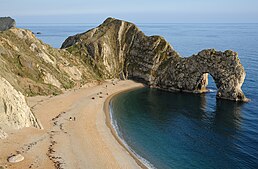Dorset | |
|---|---|
 | |
| Coordinates: 50°48′N 2°18′W / 50.800°N 2.300°W | |
| Sovereign state | United Kingdom |
| Constituent country | England |
| Region | South West |
| Established | Ancient |
| Time zone | UTC+0 (GMT) |
| • Summer (DST) | UTC+1 (BST) |
| UK Parliament | List of MPs |
| Police | Dorset Police |
| Ceremonial county | |
| Lord Lieutenant | Michael Dooley |
| High Sheriff | Anthony Woodhouse[1](2023–24) |
| Area | 2,653 km2 (1,024 sq mi) |
| • Rank | 20th of 48 |
| Population (2022)[2] | 785,172 |
| • Rank | 32nd of 48 |
| Density | 296/km2 (770/sq mi) |
| Ethnicity | 97.9% White |
| Unitary authorities | |
| Councils | Bournemouth, Christchurch and Poole Council Dorset Council |
| Districts | |
 Districts of Dorset Unitary | |
| Districts | |
Dorset (/ˈdɔːrsɪt/ DOR-sit; archaically: Dorsetshire /ˈdɔːrsɪt.ʃɪər, -ʃər/ DOR-sit-sheer, -shər) is a ceremonial county in South West England. It is bordered by Somerset to the north-west, Wiltshire to the north and the north-east, Hampshire to the east, the Isle of Wight across the Solent to the south-east, the English Channel to the south, and Devon to the west. The largest settlement is Bournemouth, and the county town is Dorchester.
The county has an area of 2,653 km2 (1,024 sq mi) and a population of 772,268. Around half of the population lives in the South East Dorset conurbation, which contains three of the county's largest settlements: Bournemouth (183,491), Poole (151,500), and Christchurch (31,372). The remainder of the county is largely rural, and its principal towns are Weymouth (53,427) and Dorchester (21,366). Dorset contains two unitary authority areas: Bournemouth, Christchurch and Poole (BCP) and Dorset. The county did not historically include Bournemouth and Christchurch, which were part of Hampshire.
Dorset has a varied landscape of chalk downs, steep limestone ridges, and low-lying clay valleys. The majority of its coastline is part of the Jurassic Coast World Heritage Site due to its geological and palaeontologic significance, and features notable landforms such as Lulworth Cove, the Isle of Portland, Chesil Beach and Durdle Door. The north of the county contains part of Cranborne Chase, a chalk downland. The highest point in Dorset is Lewesdon Hill (279 m (915 ft)), in the southwest.
There is evidence of Neolithic, Celtic, and Roman settlement in Dorset, and during the Early Middle Ages the region was settled by the Saxons; the county developed in the 7th century. The first recorded Viking raid on the British Isles occurred in Dorset during the eighth century, and the Black Death entered England at Melcombe Regis in 1348. The county has seen much civil unrest: in the English Civil War an uprising of Clubmen vigilantes was crushed by Oliver Cromwell's forces in a pitched battle near Shaftesbury; the doomed Monmouth Rebellion began at Lyme Regis; and the Tolpuddle Martyrs, a group of Dorset farm labourers, were instrumental in the formation of the trade union movement. During the Second World War, Dorset was heavily involved in the preparations for the invasion of Normandy, and the large harbours of Portland and Poole were two of the main embarkation points. Agriculture was historically the major industry of Dorset, but is now in decline in favour of tourism.
- ^ https://dorsetchamber.co.uk/anthony-woodhouse-takes-office-as-the-new-high-sheriff-of-dorset/
- ^ "Mid-2022 population estimates by Lieutenancy areas (as at 1997) for England and Wales". Office for National Statistics. 24 June 2024. Retrieved 26 June 2024.


